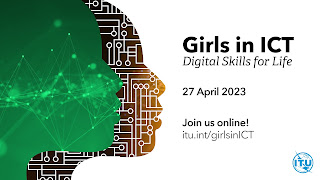Digital Skills For Life
“To create a more diverse and inclusive tech world, we need to inspire and empower the next generation of female role models to pursue and develop their career in technology and become innovators, leaders and entrepreneurs.”- Anna Radulovski.
The education system is riddled with numerous inequalities which have been exacerbated by the COVID-19 pandemic. There is no level playing field; not all schools are equal in terms of students’ outcome. Some of our schools have a strong tradition of doing well in the sciences and in technology; on the other hand some schools are not as well resourced for various reasons and perform poorly in these critical areas. Our parents are very much aware of this fact hence the fight to get their children into those schools which are perceived in the wider society as schools of choice. Traditionally, subjects such as physics and chemistry have not been viewed as subjects for girls and this has been problematic. As the international community observes The International Day for Girls in ICT we can all agree that not enough is being done to encourage our young women and girls to enter those career choices in the fields of science, technology, engineering and mathematics (STEM). For girls and young women to thrive in science, technology, engineering and mathematics (STEM) careers, they need to acquire skills to become both ICT users and creators in the digital world. International Girls in ICT Day is celebrated on the fourth Thursday in April to stress the importance of girls in Information and Communications Technology (I.C.T.) and encourage more girls and young women to pursue STEM education. This year, it takes place on April 27. This year’s theme is “Digital Skills for Life”.
History of International Girls in ICT Day
In 1822, Charles Babbage, an English mechanical engineer and polymath, invented the first mechanical computer. This computer, called the Difference Engine, was designed to perform basic computations and solve complex calculation problems. It had storage where data was temporarily held, and outputs were stamped into soft metal. Looking at the limitation of the Difference Engine it could only perform one operation Babbage decided to go a step further. In 1833, he devised the Analytical Engine. This automatic mechanical digital computer could perform all calculations and store up to 1000 50-digit numbers (more than any computer built before 1960). The machine consisted of four components: the mill, the store, the reader, and the printer. Inputs were to be entered using punched cards, and the machine was to be steam-driven and operated by one attendant. However, the device was not built as he could not obtain funding. In 1843, Augusta Ada King, the Countess of Lovelace, published a paper explaining the Analytical Engine and made a comparison between it and existing calculators. In 1843, she wrote the world’s first computer programme by sequencing instructions on the punched cards that the Analytical Engine used. At the time, King was the only expert in the world in programming. In 1945, the University of Pennsylvania academics John Mauchly and J. Presper Eckert Jr. led a project to build the first electronic programmable computer in the United States. The computer called ENIAC (Electronic Numerical Integrator and Computer) was Turing-complete and could be programmed for many complex problems. The programming of the ENIAC was handled by six women, known as the “ENIAC girls.”
Engendering A Culture of Digital Skills
Digital skills are defined as a range of abilities to use digital devices, communication applications, and networks to access and manage information. They enable people to create and share digital content, communicate and collaborate, and solve problems for effective and creative self-fulfillment in life, learning, work, and social activities at large. At the advanced spectrum of digital skills are the higher-level abilities that allow users to make use of digital technologies in empowering and transformative ways such as professions in ICT. Major digital transformations such as Artificial Intelligence (AI), machine learning, big data analytics, change skills requirements and, in turn, impact capacity building and skills development for the 21st century digital economy. There are major inequalities in digital skills in both developing and developed countries. The proportion of women using the Internet is 12% lower than the proportion of men using the Internet, and the gender gap in Internet usage has widened between 2013 and 2017,
With technology playing a vital role in numerous career choices from art and history to law, primary teaching and graphic design, learning tech skills at a young age will establish girls for financial independence. Undoubtedly, the ICT sector needs more girls and women.
As we celebrate Girls in ICT Day let us recommit to a national policy to fund more STEM education across the island. Let us also redouble our efforts to encourage more young women and girls to enter those career options which historically have been viewed as the bastion of male privilege.
Happy International Girls in ICT Day.
In the words of Alisha Ramos, it’s not enough to be aware of the possibilities. You have to believe that your goals are attainable. First, can you see yourself, picture yourself as an engineer?
Wayne Campbell is an educator and social commentator with an interest in development policies as they affect culture and or gender issues.
waykam@yahoo.com
@WayneCamo
©
#GirlsinICTDay




Comments
Post a Comment